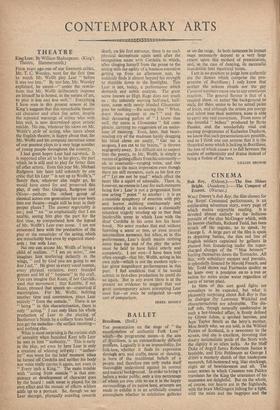CONTEMPORARY ARTS
THEATRE
King Lear. By William Shakespeare. (King's Theatre, Hammersmith.)
FOUR years ago one of our foremost critics, Mr. T. C. Worsley, went for the first time to watch Mr. Wolfit play Lear " before it was too late." By too late, Mr. Worsley explained, he meant—" under the restric- tions that Mr. Wolfit deliberately imposes on himself he is bound, in the nature of art, to play it less and less well." Everything I have seen in this present season at the King's suggests that this remarkable theatri- cal character and often fine actor, despite the repeated warnings of critics who wish him well, is now determined upon artistic suicide. No one, whatever his views on Mr. Wolfit's style of acting, who cares about the English theatre, is happy about that, for Mr. Wolfit and his company introduce some of our greatest plays to a very large number of young people throughout the country.
I had great hopes Lear had survived. It is supposed after all to be his glory, the part which he is still said to play far better than all other actors. Even this year Mr. Michael Redgrave has been told solemnly by one critic that his Lear " is not up to Wolfit's." Surely then, whatever else might go, he would have cared for and preserved this play, if only that Gielgud, Redgrave and Olivier—perhaps the richest group of classical actors one generation has ever born into our theatre—might still be kept in their proper places ? The answer regrettably is no ; • and " no " so emphatically that I am unable, seeing him play the part for the first time, to comprehend how the legend of Mr. Wolfit's Lear ever arose. I am not concerned here with the production of the play or the remainder of the acting, which are remarkably bad even by expected stand- ards ; but with Lear.
No one can accuse Mr. Wolfit of being a child of realism. " I am an actor," one imagines him muttering defiantly in the wings, " and by God you are going to see how I act." He gives us every vocal nuance, every physical variation, every branded gesture and bit of " business" in the craft. You can imagine that Kean, if not Garrick, used that movement ; that Kemble, if not Kean, phrased that speech so—oratorical if meaningless. For Mr. Wolfit, befitting another time and convention, plays Lear entirely " from the outside." There is no " being " in this characterisation, there is only " acting." I can only liken his whole production of Lear to the playing of Beethoven's Ninth by a colliery brass band ; you get the melodies—the surface meaning— and nothing else.
What is most surprising is the curious stab of unreality when banished Kent tells Lear he sees in him " authority." This is early in the play, yet even by here Lear is only a creature of whining self-pity " author- ity" was worn for the brief moment when he turned off Cordelia and neither his body nor voice really carries it again, not even in " Every inch a King." The main trouble with "acting from outside " is that con- sistency or development of character goes by the board : each scene is played for its own effect and the mosaic of effects seldom adds up to a portrait. So, though we see Lear decrepit, physically crawling towards
death, on his first entrance, there is no such physical decrepitude again until after the recognition scene with Cordelia in which, after slinging himself from the prone to the sitting with the agility of a business executive getting up from an afternoon nap, he suddenly finds it almost beyond his strength to shamble down to the footlights. This Lear is not, today, a performance which demands any subtle analysis. The great scene known as High Rage does not touch us : the infinitely moving half-mad, half- sane, scene with newly blinded Gloucester goes for nothing—the searing line " What, doest thou squinny at me ? " and the final devouring pathos of " I know thee well, thy name is Gloucester " fail com- pletely, carrying no suggestion of an under- tone of meaning. Even, later, that heart- rending cry of the madman hazily dragging his blind claws on sanity, " Get me a surgeon, I am cut to the brains," is thrown negligently away. It is difficult not to suspect that the poetry, to Mr. Wolfit, is simply a means of getting effects from his constantly— oh so constantly—ranging voice, and this remains as the main impression even though there are still moments, such as his first cry of " Let me not be mad" which affect the heart like a squirt of adrenalin. There is, however, no excuse in Lear for such moments being few ; Lear is not a progression from one acting " point " to another : it is an irresistible symphony of emotion with pity and horror stabbing continuously and remorselessly at its audience ; a classically relentless tragedy winding up to that final intolerable scene in which Lear with the dead Cordelia in his arms lets his heart break. No actor reaches that end without fumbling a scene or two, or even several intermediate moments, but when, as in this performance, Lear's death means nothing more than the end of the play the actor must be held to have failed utterly and completely. I am sure—I have been told often enough—that Mr. Wolfit, acting in his own style—which is not the modern style— has given magnificent performances in this part. I feel confident that if he would submit to first-class production he could do so again. But in any event there is at the present no evidence to suggest that our great contemporary actors attempting Lear need fear—or even be subjected to—any sort of comparison.
DEREK MONSEY


































 Previous page
Previous page